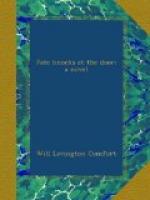They had walked for some time through the evergreens. His listening had become like a furious draught, her brain burning intensely beneath it. It had been hard for her to begin, but that was over.... “It was not until to-day that there was any need to tell you,” she was saying. “You were inspiring in other ways. I would have been stupid, indeed, not to have seen that, but somehow you seemed remote from everyday habiliments and workday New York—somehow inseparable from silences—until to-day—when you came singing Invictus. You did not let me tell you—out there—in the sunlight. You didn’t let me think of telling you.... You mustn’t judge me always so susceptible——”
She halted, lost for an instant in the emptiness.
“Please tell me about him,” Bedient said.
“Why, he was only a working boy when he first came to our house—here,” she went on. “I was just back from Paris—after years. I remember with what a shock of surprise I noted the perfection of his face. The angle was absolutely correct as the old Hellenic marbles, and to every curve was that final warmth which stone can only distantly suggest. Then he was tall, but so light and lithe——”
She knew he would not fail to see the flaw here—the artistic taint. She had heard him deplore the worship of empty line, saying that nature almost invariably travesties it.
“I was hasty, then, in my conclusion to-day,” he said, questioning, “when I asked if there was any reason why I should not tell you how great you are to me?”
“It did not seem the time to tell you,” she answered quickly. “I was wrong, but—it was not wrong to him! Please don’t think that! I sent him away.”
“Oh, I see better—thank you. And now go on, Beth, please——”
“You see, he was my work——”
Beth’s mother now called from the front door. She was going upstairs and would say good-night to Mr. Bedient.
“Go to her,” Beth whispered. “I shall see her later.”
... And now she stood alone by the gate, her mind seething. Forces within falteringly implored her to go no further. She found in his few brief questions that old fidelity to truth that had been one of his first charms. This helped to unsteady her. Was she not wrong to judge this man by the standards the world had made her accept for others?... The day came back. Why had Wordling been so far from her mind out there in the sunlight? Radiant with health, thrilling with mysteries, in the summit of her womanhood, she had been above fear, and he above evil. The Shadowy Sister, too, had gone forth to meet him, majestic and unashamed. What spell was that which had come over her, a perfect vein-dilation in the brilliant light? Why, it had seemed to her that she could feel the pulse of flower-stems, and paint the nervous systems of the bees. Painting—what a pitiful transaction was art (in the divine stimulus at that hour) compared to the supernal happiness of evolved motherhood! And what exquisite homage had he shown her! And the long talk, his mind crowded with pictures like memories of a world-voyage! Again and again, there had come over her, some inner uplift, as if she were rising upon a wave.... She heard his tones now, as he spoke to her mother on the porch, and his gentleness throughout recurred.




